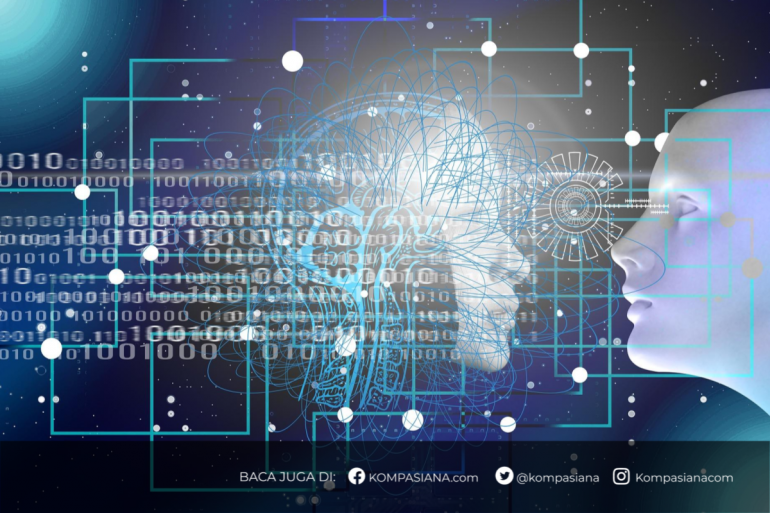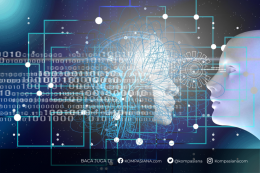This webinar delves deeply into the role of Artificial Intelligence (AI) in the global digital business world and how this technology is rapidly evolving and impacting many industries.Since it was first defined in 1956 as "the science and engineering of making intelligent machines," AI has evolved into a technology that can simulate human learning, problem-solving, decision-making, and various processes typically performed by humans.AI is currently integrated into various applications, ranging from chatbots, virtual assistants, recommendation systems, to autonomous cars, making daily life easier and supporting efficiency in the operations of various companies.
AI has entered many industries in the business world, such as healthcare, education, finance, and manufacturing.The use of AI provides ease in faster decision-making, processing large amounts of data, and reducing human errors.For example, AI can predict market conditions or consumer trends in the future through machine learning, which is a fundamental component of AI, and enables faster decision-making and processing of large amounts of data, as well as reducing human errors.
One example of a company that uses AI for business development is Tesla. Tesla is globally recognized for its ability to use advanced technologies, especially AI, in manufacturing cars and their components. This helps Tesla stand out in innovation compared to its competitors. Tesla not only uses AI but also integrates the Internet of Things (IoT) and robotics into its industrial processes. This indicates that Tesla is moving toward full automation and real-time data usage to enhance productivity. Tesla utilizes computer vision technology to analyze images or videos from its production lines. This helps detect problems or defects without the need for time-consuming manual inspections. With AI, Tesla can detect product defects in real-time during the production process. This allows immediate corrections, reduces the number of defective products produced, and ultimately saves both costs and time. Tesla also uses AI to "monitor the health" of its machines and equipment. If AI detects early signs of failure, Tesla can make repairs before the machine completely breaks down, thus avoiding costly downtime.
Another example, Unilever also uses AI for business development in terms of collaboration. Unilever launched a cloud-based digital platform that connects all parties in its distribution network, from distributors to retailers across different countries. This helps instant data exchange and strengthens collaboration throughout the supply chain. With AI support, Unilever can share real-time sales and inventory data with partners like Walmart Mexico. This improves stock planning and ensures that products are available according to market demand. This platform not only connects them but also uses AI-based analytics to enhance the effectiveness of teamwork among distribution, sales, and retail teams, making operational execution faster and more accurate.
Why does AI matter? AI is not just a temporary trend but a major force transforming old business methods into new, more advanced and innovative systems. The future of AI depends on how humans create new opportunities and guide the integration of AI into social life for the betterment of well-being and business efficiency. AI will take over repetitive tasks, giving people more time to develop in areas like behavior, attitude, and cognitive abilities. This encourages a shift toward improving human quality, not just work productivity.
How AI is reshaping business efficiency and globally? Global companies leverage AI to speed up work, improve output quality, and lower operational costs. AI automates repetitive tasks, saving thousands of working hours and allowing companies to allocate resources to more important tasks. With AI, companies gain live insights from real-time data, enabling faster and more accurate decision-making. AI helps generate new ideas through generative tools, accelerating the innovation process across different fields. AI is applied from supply chain management (logistics) to marketing strategies to cut costs and boost output volume.
And how AI learns our prompt to develop a business? First, AI use Regression, Regression predicts continuous numerical values, like house prices. Second, Decision Trees. Decision trees help make decisions based on branching conditions. Third, Random Forest. Random Forest combines multiple decision trees to improve prediction accuracy. And last, Classification. Classification assigns data into categories, like spam or not spam.
AI also has a variety of ways of working according to the commands we need to ask. There are 7 varieties of AI work. Machine Learning, Deep Learning, Data Science, Computer Vision, Expert System, Neural Networks, Natural Language Processing. Machine Learning allows AI to learn from data and make predictions or decisions without explicit programming. Deep Learning uses multi-layered neural networks to process complex data like images and sounds. Data Science blends statistics, data analysis, and machine learning to extract insights and inform decisions. Computer Vision enables AI to interpret visual information from the world, like recognizing objects in images or videos. Expert Systems replicate the decision-making ability of human experts using rules and logic. Neural Networks mimic the human brain's structure, using interconnected nodes to recognize patterns and learn from data. Natural Language Processing allows AI to understand, analyze, and respond to human language.
Of the many topics discussed, one that caught the attention was discussing 'Prompt Engineering', which is a way to design effective instructions or commands with the aim of providing more relevant results and in accordance with user needs. This technique is an important essence in the relationship between humans and machines, because with this AI can be maximized in providing benefits that are in accordance with user desires.
AI has been widely distributed and utilized in all industries in Indonesia, including the creative and technology industries. For example, in the fashion industry, local companies use AI as a tool to market products with a limited budget. For small to medium-sized companies, AI makes it easy to analyze market trends in real-time and adjust marketing strategies that suit their company. Currently, AI is beneficial for all groups, not only large companies but also small to medium-sized businesses with limited budgets.
From a global perspective, AI continues to evolve, and the technology is becoming easier to adopt by more and more businesses due to the various AI platforms available. Due to the benefits it offers such as better efficiency, faster decision-making, and the ability to process large amounts of data, AI is becoming a very important component in the digital transformation taking place in the business world.







